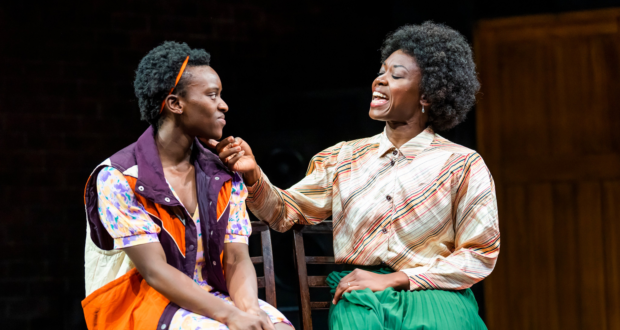A deeply moving, riveting play that boldly addresses the complexities of care.Summary
Rating
Excellent
The Darkest Part of the Night is a poignant, thrilling piece of theatre. It follows a family in Leeds in the early 80s and the present-day. The modern scenes are set after the death of Josephine (Nadia Williams), Dwight, who is an autistic person (Lee Phillips), and Shirley’s mother (also Williams). Engaging and exciting throughout, it delves into intersectionality and the complexities of these intersections. Race, disability and gender are discussed with a multifaceted, intelligent and exciting voice. Care and specifically care for someone with autism are complex matters for a family to navigate: what is best and who knows best?
This is great writing, with so many themes deconstructed in a fresh way. Love, family, bullying, and neurodivergence are all addressed boldly. Writer Zodwa Nyoni’s dialogue is precise, with nothing said that doesn’t add to the narrative. This is occasionally to the detriment of the piece, as some elements of story are rushed, but it’s a small price to pay in such an action-packed play. The social commentary feels genuine in the voices of the characters and makes sense, and she totally nails the dynamic of family drama. The characters are real people, rounded and flawed, which makes them very likeable.
The script is delightfully propulsive, heart-breaking and suspenseful, but always moving along just at the right time. The story is told primarily through the lens of Dwight, and directorial and design choices help communicate this perspective. Nancy Medina’s direction is really slick, her decisions meaningful. Interesting and risky creative choices support the telling of the story, adding to it significantly. Scenes morph into each other, giving the piece real drive, and props click into place in a very satisfying way.
It’s a committed and extremely connected group effort from the cast. Every actor on stage has moments of theatrical brilliance and they are all excellent vocally. Williams’ Josephine is played beautifully: she’s funny, witty and powerful, yet has a complex knot of problems under her strong matriarchal exterior. Leroy is a standout character in terms of writing; a case study in masculinity and the hypocrisies of man. Andrew French plays him delicately but still with power and precision. Brianna Douglas’ Shirley is playful and caring; a youthful and charismatic presence onstage. The standout performance, however, comes from Phillips as Dwight. The actor – himself neurodivergent – plays an autistic person and is dynamic, funny, emotionally engaging and utterly watchable. It’s consistent and absolutely magnetic.
A rich and artistic world is created through audio by sound designer Elena Peña. Dub and reggae tracks weave into the story, and reverb and echo are creatively utilised to illustrate Dwight’s emotional experience. He is heartrendingly lonely and misunderstood at times, and the sound makes this theatrical, shared deeply with the audience as echoes of the music shift into a representation of his mind.
The visual design is also on point. Jean Chan’s set with Guy Hoare’s lighting is simply striking. The set is composed of a sound-system stack of speakers at the rear and a giant revolving vinyl record on the playing space floor. Dwight’s performance on the spinning record juxtaposes the comfort he (and all of us) gets from music and dance with the instability and constant struggles of life, especially as a black person in 1980s Britain. The movement throughout is expressive but never feels pretentious, and it’s always necessary within the play.
The Darkest Part of the Night is a superb production, punctuating a significant moment in history. It is an astoundingly moving story that showcases British, Black British, and Northern culture and should be seen by all.
Playwright: Zodwa Nyoni
Director: Nancy Medina
Assistant Director: Stephen Bailey
Designer: Jean Chan
Lighting Design: Guy Hoare
Sound Design: Elena Peña
Movement Director: Ingrid Mackinnon
The Darkest Part of the Night plays at Kiln Theatre until 13 August 2022. Further information and bookings can be found here.
 Everything Theatre Reviews, interviews and news for theatre lovers, London and beyond
Everything Theatre Reviews, interviews and news for theatre lovers, London and beyond



